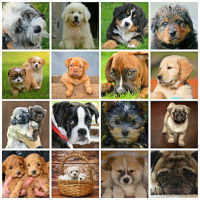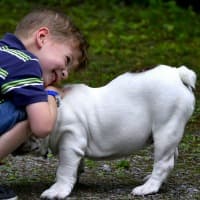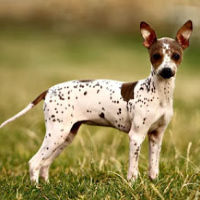FYI: If you buy something through a link on this site I may earn a commission - at NO extra cost to you.
Choosing The Right Breed Of Dog
The importance of choosing the right breed of dog can't be overstated!
I do know how easy it is to fall in love with the first set of puppy-dog eyes you see.... but if you want the relationship between you and your new pup to be a long & happy one, you need to pick a breed that is a good fit for your personality, environment and lifestyle.
The first question you're most likely to ask yourself is "what do I want in a puppy?" But the real question is "what do I want in a dog?"
Every chubby, fluffy little puppy will eventually grow into a full-size, adult dog with his own personality, quirks and characteristics and inborn instincts. A furry package of strengths, weaknesses, breed-specific traits, inclinations and contradictions.
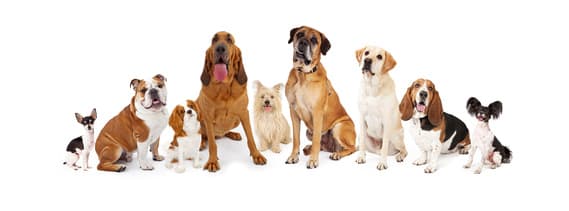
The key to a happy ending is to choose a pup whose specific breed traits (such as size, temperament, activity level, grooming needs and so on) and individual personality will mesh with your expectations and abilities.
Quick Links:
Tips For Choosing A Dog Breed
if you don't understand the type of dog your puppy will grow into, it can end up being frustrating and disappointing instead.
Some important things to think about include:
- The size of your home - whether you live in a large
house or an apartment, or something in between, can affect the size of type of dog breed you choose.
- Your family activities - an active
'outdoors' type family will be a better fit for an energetic working breed while a quiet, sedentary family might better appreciate a lap-dog.
- Family members - not all dog breeds are good with children. Some are fine with older kids, but not a good fit for little ones. If anyone in your home has allergies you're going to want to look for a hypoallergenic or hairless breed.
- Available time - all puppies demand a LOT of your time and attention. Some breeds need much more exercise, training and socialization than others.
- Your finances - Raising and keeping a dog can be costly, and this is true for ANY breed. But 'start up' costs are higher if you choose a purebred pup rather than a mixed breed or adopt from a pound/rescue organization. Large and giant breeds obviously cost more on upkeep as they take the XL size of everything.
some examples......
The above criteria can be broken down even more, and combined in a whole host of ways, but taking the time to consider each one will help you make the right choice.
To help you out just a little more, here's a quick look at how it might shape up:
- If you're a first time dog owner; have limited space at home; don't want to invest much more energy than the daily walk and some basic training; and would like to take your dog out and about with you a lot of the time... then a small dog might be a good choice. Most terriers can be feisty and active which might not work well, but the Cavalier King Charles Spaniel, Dachshund, Italian Greyhound, Maltese or Shih Tzu are all possibilities. There are more of course, but this is just a quick guide!
- If you're an experienced dog owner, have a reasonable amount of space at home, are physically active and want to spend time working with/training your dog and maybe even joining a dog-oriented sport like agility, then a smart, energetic working breed might be just the ticket. Think Airedale Terrier, Australian Shepherd, Border Collie, Boxer, German Shepherd or German Shorthaired Pointer.
- For first time, or experienced, dog owners looking for a laid back family dog who will be equally content to take walks and play in the yard or nap on the sofa with the kids, breeds like the Beagle, Boston Terrier, Golden Retriever, Labrador Retriever or Poodle (or Doodle) could work perfectly.
Bear in mind that every puppy is an individual, and personality naturally varies, so none of this is set in stone, however matching breed traits and inclinations to your life and desires is very important for a happy long term match.
Temperament & Personality
The first step here is to get an idea of the breed-specific traits of the dogs you're interested in.
Every breed was developed with a particular purpose or 'job' in mind. Some might be all-purpose working dogs, filling the roles of herder, guard dog and loyal friend. Others were bred as companion animals, especially designed to sit on your lap!
Some of the smartest dog breeds around are hunters, herders, retrievers or guardians and these guys NEED a job to do! They also need a lot of exercise and both mental & physical stimulation. If they don't get it they can become unhappy, neurotic and destructive.
The second step is to look at the blood-lines and parents of your puppy.
Temperament isn't just dependent on breed-characteristics, genetics play a big role too.
Meeting, and interacting with, the sire and dam of a puppy will give you a good idea of the type of personality traits your new pup might have.
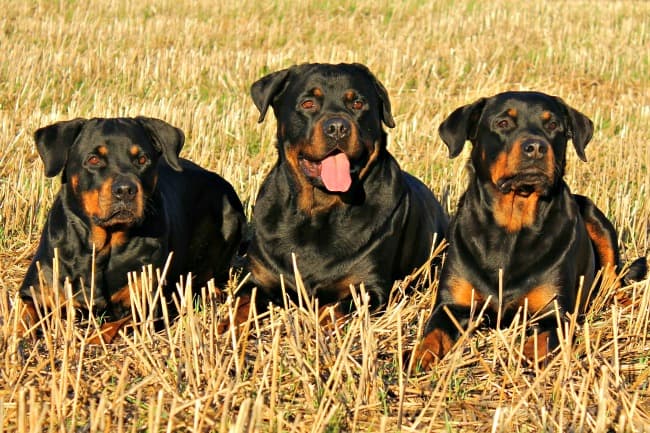
Of course, all puppies are unique and within any litter there will be a range of personalities.. from the shy, quiet pup right through to the dominant, bossy one.
Choose a reputable, responsible breeder and let them guide you when you make your pick. If you tell a breeder what you want from this puppy and what you can offer him/her, they'll be able to steer you in the right direction.
If you want to adopt a puppy or are planning on adopting an adult or older dog, take the time to talk with the staff at the shelter/pound.
They usually have some background information on each dog, and also an idea of their personality, drive, abilities and so on, because they're seeing them on a daily basis.
Dog DNA Testing for mixed breed pups & dogs
This is a scientific (and accurate!) way to learn about your mixed breed dog's genetic background. Knowing which breeds are part of your dog's physical and psychological make up comes with a whole host of benefits and makes it easier for you to keep your puppy or dog healthy and happy.
These are just a few of the most important ones:
- Understand his exercise and stimulation needs
- Get the best results when training
- Be aware of potential breed-specific health issues
- Test for genetic drug sensitivities
- More accurately predict adult weight
These canine genetic testing kits can identify hundreds of different breeds and Wisdom Panel is one of the the most popular, and established options. Choose from Wisdom Panel 3.0 (tests for 250+ breeds and for multi drug sensitivities), Wisdom Panel DNA Test Kit (tests for 350+ breeds and also gives you a predicted weight profile) or Wisdom Panel Canine Health DNA Test Kit (screens for 250+ breeds and for 150+ genetic health conditions)
Physical Considerations
Some large dog breeds, such as the English Mastiff, are very big but they don't need a huge amount of space or exercise because they're not very energetic.
Then you have the Jack Russell Terrier (or Parson Terrier), generally a whirlwind of energy and spunk. He may be more than you, or your home, can handle.
Now, you may be able to rule out some of the options right away if you have size, space, and exercise or time restrictions.
For example, if you don't want to spend time grooming your dog every day or two, choose a dog breed with a wash-and-wear type coat rather than full coated Shetland Sheepdog or a Komondor with those fantastic dreadlocks.
If you live in an apartment, a Great Dane may not be as strange an option as you might think because as adults they're a pretty laid-back breed. BUT, they do take up a lot of space even when they're not moving.
So, a two bedroom apartment with a small balcony might work out just fine, but a tiny bedsit or similar might make life a little crowded.
If you have very young children, or an elderly, frail or chronically ill family member, one of the extra large breeds might not be a good choice.
Big dogs can be clumsy as puppies, and as adults could easily knock someone over totally by accident.
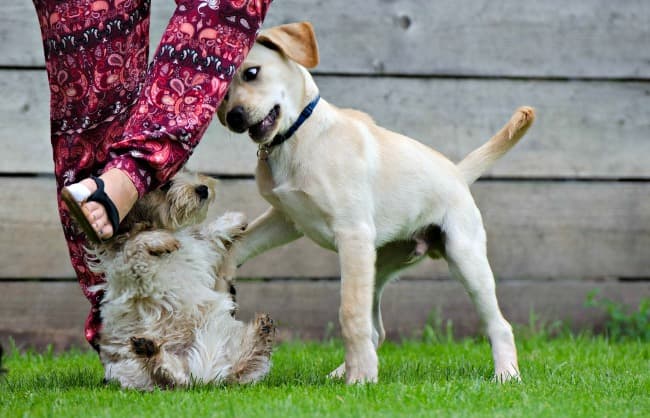
Perhaps this will surprise you - very tiny breeds are often (not always) not a great choice for a family with very small children.
This is because these little guys can be very fragile, and toddlers aren't known for their fine motor skills or gentle hands!
A teacup puppy could be seriously injured or even killed by being dropped, or even by being squeezed too hard.
Once you've narrowed it down, do some more in-depth research on the dog breeds that you're most interested in, before making a commitment.
Regardless of the size of the pup/dog you decide on, choosing a healthy puppy in the first place will help reduce the chances of serious or chronic health problems that need ongoing vet care.
But all pets are going to have veterinary bills (the routine ones and the not-so-routine ones) so be prepared and make sure you can afford whatever little Fido needs. Now or in the future.
Dog Breed Profiles
Now, for fun, let's take a quick look at the personalities of a handful of the most popular dog breeds.
Do remember though, every single puppy is a unique individual and he may, or may not, fit the broad characteristics of his particular breed.
The Lovers
If you want a dog breed that will shower you with affection at the drop of a hat (and everyone else too for that matter!), there are a lot of very popular breeds that will fit the bill.
The 'Lovers' are generally friendly and outgoing, and greet other dogs and people as if they've been best friends for years. They usually make excellent family dogs and get along well with children.
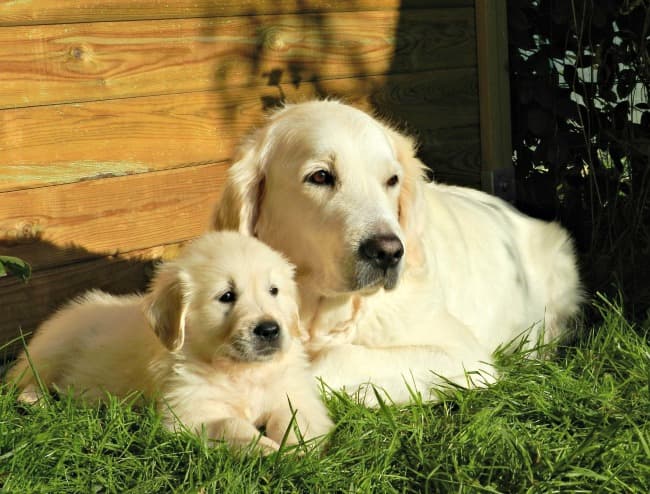
If
you think one of these dogs might fit the criteria you're using to choose the right breed of dog , you may want to consider one of these
breeds.... Labrador Retriever, the Golden Retriever, the Labradoodle or Goldendoodle, the Dalmation, the Bernese Mountain Dog, the Cocker Spaniel, the Boxer, most Mastiffs, the English Bulldog, the Shih Tzu, the Maltese, the Italian Greyhound, the Dachshund or the Beagle.
These dogs come in all shapes and sizes, but many of them are medium to large-sized dogs, so make sure your sofa (and your lap) can support a 90lb lap-dog!
The Heroes
If you're looking for a dog breed that can protect both you and the family heirlooms, there are a several to choose from.
Many of the 'Heroes' also make fantastic family companions and excel at sports and activities such as tracking, obedience and agility.
They're generally large dogs, often with high activity levels and are extremely intelligent. But don't forget that the bigger the dog, the bigger the financial cost.
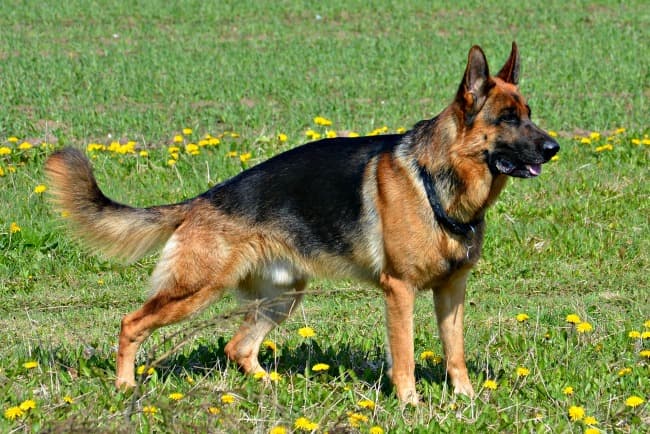
Luckily, big dogs don't always need a
lot more space (indoor or outdoor) than their more average-sized
cousins, but they do need regular exercise and training.
Here are a few dog breeds that fit into this category... the German Shepherd, the Rottweiler, the Doberman Pinscher, the Belgian Malinois, the Anatolian Shepherd, the Cane Corso and the Airedale Terrier.
These dogs all make good personal body guards!
When you're choosing the right breed of dog for your family and want a 'hero', but are short on space or prefer a small dog, it is possible to find them.
Some small dogs THINK they're guard dogs (eg the Chihuahua or Yorkshire Terrier), and if all you need is the 'bark' you may want to take them into consideration.
The Teacher's Pet
Do you want a dog who'll make you look good at obedience school? Or one who'll ace the agility course?
If this is important when you're choosing the right of breed dog, take a look at the Border Collie, the German Shepherd, the Golden Retriever, the Poodle, the Teruvian Shepherd, the Australian Shepherd or the Shetland Sheepdog.
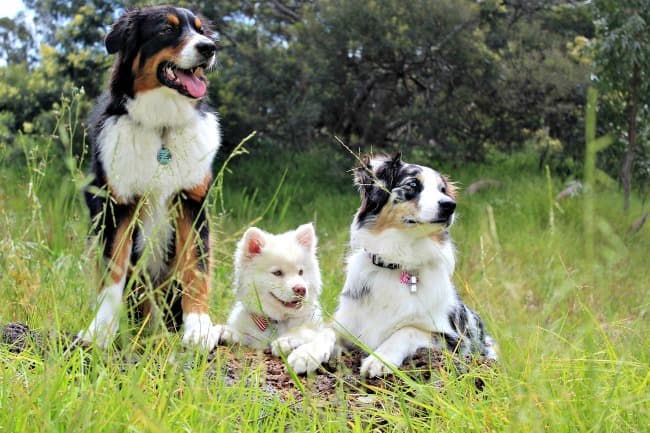
Any
dog that was bred to work under human direction (such as a
sheepdog/herder, a hunting dog, a service dog, or a search and rescue
dog for example) is likely to fit this role well.
This type of dog is very smart, eager to please and very focused on their owner.
The downside is that some of them have high energy levels, can be a bit 'nippy' (herding dogs are notorious for this) and may need a lot of exercise both mental and physical.
However, if you want to compete in sports or obedience, to teach 'tricks' or to hunt etc., then one of these breeds could be just what you're looking for.
Your Exercise Partner
If you're looking for a dog breed that will happily accompany you on your daily run, or one that is super-active and will appreciate any outdoor pursuit, then one of these breeds could be the perfect choice.
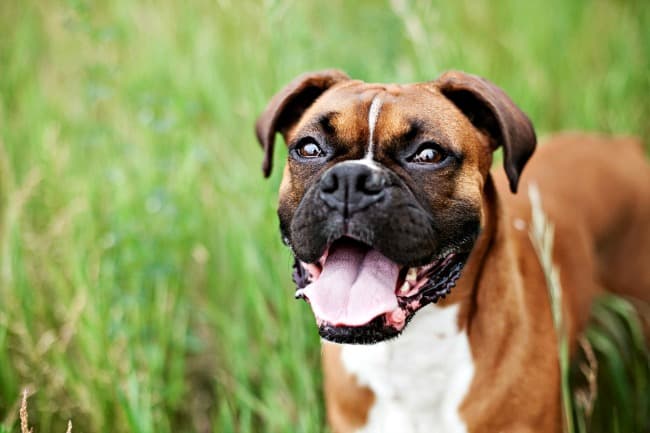
The Border Collie, the Australian Shepherd, the
Siberian Husky, the Greyhound (or a Lurcher), the German Short-haired
Pointer, the Rhodesian Ridgeback, the Flat Coated Retriever, the Boxer,
the Labradoodle, the Weimeraner or the Irish Setter.
If you think you may be overestimating your athletic potential, but still want to keep your options open, you could also look at the Schnauzer, the Jack Russell Terrier or the Labrador Retriever.
The smaller breeds here won't be able to go as far, or for as long, as the larger ones but they may surprise you with just how much energy they actually have!
Herding, hunting and some working/sporting breeds can have a high prey drive, which means they're hard wired to chase down small animals.
Because it's been bred into them, it can be difficult to get a dog with a high prey drive to get along with other small pets unless they're raised around them and have had training that teaches them to be less reactive.
If you want an energetic dog that can get along with everyone in the family make sure to do some research and try to pick a low prey drive dog breed.
Your Silent Partner
There are all sorts of reasons that you may prefer to choose a dog breed that can play the role of a silent partner!
Perhaps you live in an apartment, or duplex with thin walls, or maybe you work from home, simply can't tolerate a lot of noise, or just have very tetchy neighbors!
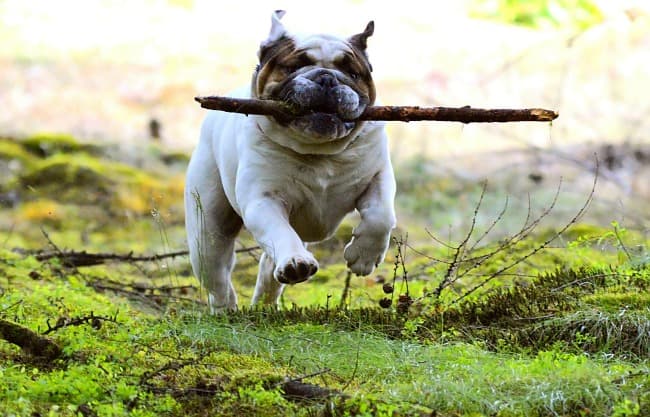
Whatever the reason if you're choosing the right breed of dog for this scenario consider one of these....
The Cavalier King Charles Spaniel, the Beagle, the Greyhound (or Italian Greyhound, Whippet or Lurcher), the English Bulldog, the Maltese or the Pekingese.
The Basenji doesn't bark at all (but it 'yodels' instead).
Bear in mind that even though these breeds tend to be quieter, and less yappy, than many others - they will still bark. As a warning, in play, to complain and so on.
Puppies tend to be more vocal than adult
dogs and when you're crate training, or playing with them, there can be
quite a bit of noise.
you might also like...
- Home
- Dog Breed Information
- Choosing The Right Breed Of Dog
FTC Disclosure: Some pages on this site contain affiliate links. I may earn on qualified purchases.

